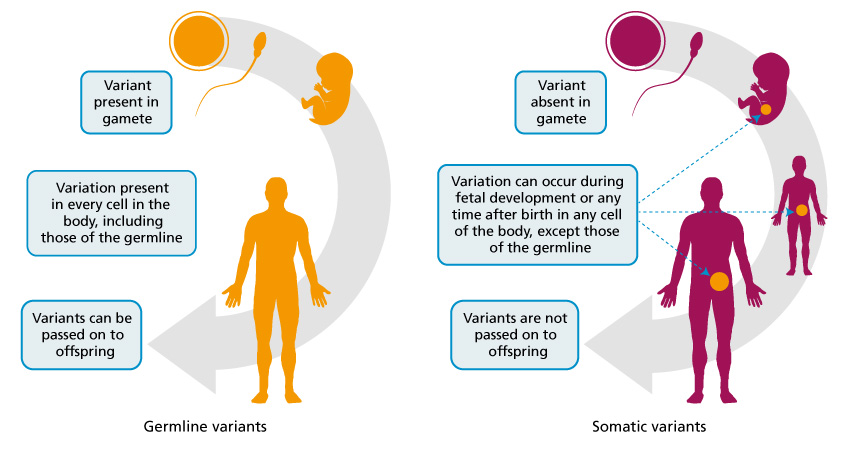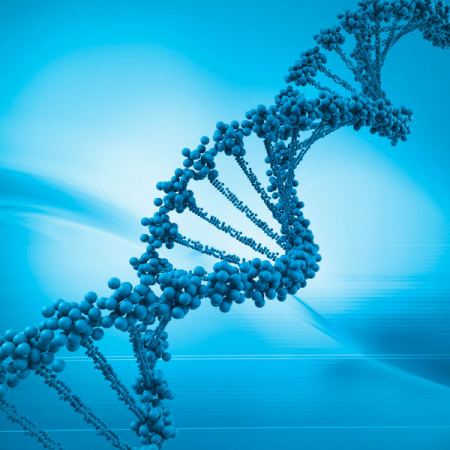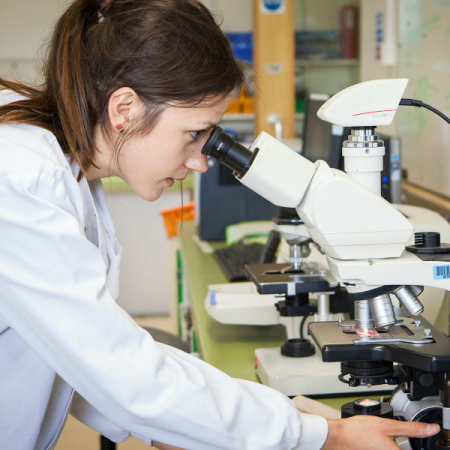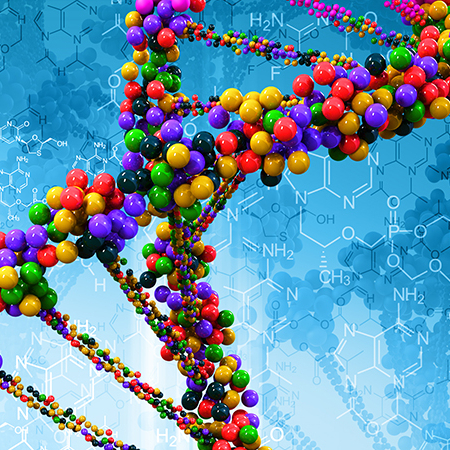Why is genomics important in cancer care?
Simply put, cancer is a disease of the genome. It occurs when changes in a person’s genome – their DNA – result in cells growing and dividing uncontrollably. These genomic changes – or variants – can be inherited from a parent or acquired at some point during a person’s lifetime.
Most cancers are caused by acquired genomic variants. In around 5% of cases, however, the individual has inherited a variant that greatly increases their chances of developing cancer.
Inherited (germline) genomics variants vs acquired (somatic) variants

Two kinds of cancer variants
Inherited variants
Inherited genomic variants are also called germline variants. These variants are present in almost all of a person’s cells, and some rare variants increase the person’s chances of developing cancer. It is important to identify when a patient has this kind of germline variant, as it can have implications for their clinical care.
A patient with this type of variant may be offered additional screening or prophylactic surgery. For example, patients with particular BRCA1 and BRCA2 gene variants may opt to have a preventative mastectomy or oophorectomy.
It is also important to consider the implications for the patient’s family, as appropriate testing can identify other at-risk relatives who may be able to take measures to reduce their chance of developing cancer.
Acquired variants
Acquired genomic variants are called somatic variants, and these variants are present only in cancer cells. These variants are not inherited and cannot be passed on to any children.
Somatic variants can be the result of exposure to environmental factors, such as ultraviolet light, smoking, radiation and alcohol, or they can be entirely random. Each time a cell divides, errors might be introduced. While there are many mechanisms within the cell to correct these errors, occasionally they are missed.
Click the image to hear honorary consultant in clinical genetics Professor Clare Turnbull describe how genomics is used in cancer care. You can visit our oncology page for more detailed information about advances in cancer care and treatment.
Refining treatment
Some genomic variants within the cancer genome can be used to work out the most appropriate treatment for the patient. Some variants can make the person more, or less, likely to respond well to particular treatments.
For example, tumours with certain variants in the EGFR gene respond well to EGFR-inhibitor drugs, but those without such variants do not. So two people with the same diagnosis of breast cancer may have different treatments based on the genomic information from their tumour.
Novel treatments can also be identified by sequencing the tumour’s genome. Click the image to hear specialist registrar Dr Alison Berner discuss the impact this is having on patients.
Cancer genomics in the NHS
Advances in cancer genomics have been shaping oncology practice and patient care at a rapid pace. We’ve developed films and supporting material for oncologists and other specialists working in this area.
The NHS Genomic Medicine Service (GMS) will bring further changes, including equity of access to genomic testing for patients across England for the first time. But what will this mean for cancer care?
In a special edition of the Genetics Unzipped podcast, produced in partnership with the Genetics Society, we hear from honorary consultant Professor Bill Newman, clinical research fellow Dr Alison Berner, and specialist adviser in cancer treatment and recovery Dany Bell, about the foundations laid by the 100,000 Genomes Project, the transition to the GMS, and what lies ahead for cancer care in the NHS. Click the image to play the podcast.
Learn more
Continue learning about the applications of genomics in cancer care through our range of educational resources and courses.
Developing people
for health and
healthcare






